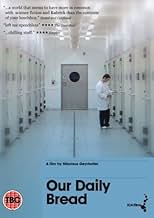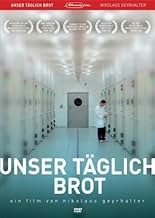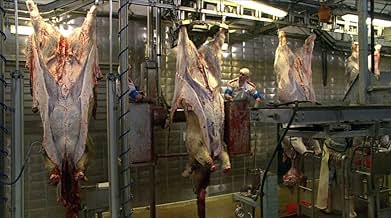IMDb-BEWERTUNG
7,5/10
2736
IHRE BEWERTUNG
Füge eine Handlung in deiner Sprache hinzuOUR DAILY BREAD is a wide-screen tableau of a feast which isn't always easy to digest - and in which we all take part. A pure, meticulous and high-end film experience that enables the audien... Alles lesenOUR DAILY BREAD is a wide-screen tableau of a feast which isn't always easy to digest - and in which we all take part. A pure, meticulous and high-end film experience that enables the audience to form their own ideas.OUR DAILY BREAD is a wide-screen tableau of a feast which isn't always easy to digest - and in which we all take part. A pure, meticulous and high-end film experience that enables the audience to form their own ideas.
- Regie
- Drehbuch
- Hauptbesetzung
- Auszeichnungen
- 4 Gewinne & 5 Nominierungen insgesamt
Empfohlene Bewertungen
This movie didn't show me anything I didn't already know, but it's silence gave me time to think about what is shown. Certainly not a movie for impatient people or after a hard day at work. It left me with a strong feeling: That industrial farming and breeding is just that - industrial. Certainly the slaughterhouse sequences touched me most. Treatment of the animals doesn't appear cruel, but very unnatural. Efficiency and detachment rule. Plants and animals don't grow and live anymore. They are produced and harvested. What's ultimately lost is the variety of life outside the human production-sphere and the human connection to the world.
It is great. Not because of the subject or because I'm so interested in the food processing industry.(I'm really not) It is great because it ask and answer some really new things about documentary.
If not new,"different" in the best possible interpretation of the word. No talking, that means no interview or voice over. No editing tricks,just perfect efficient shots, one after the other. Forget the angry guy behind the camera or the microphone who really wants to not only show but persuade you. Forget the radio-documentary, here come the images-documentary. If you liked Depardon's documentary, if you like photography, if you are tired of Mickael Moore, if you don't think you need to be told what to think when you can just see it, there is a movie for you.
Its a lot more than a documentary about food industry as far as I'm concern, its about backing up and trying to get " a bigger picture"
MAc
If not new,"different" in the best possible interpretation of the word. No talking, that means no interview or voice over. No editing tricks,just perfect efficient shots, one after the other. Forget the angry guy behind the camera or the microphone who really wants to not only show but persuade you. Forget the radio-documentary, here come the images-documentary. If you liked Depardon's documentary, if you like photography, if you are tired of Mickael Moore, if you don't think you need to be told what to think when you can just see it, there is a movie for you.
Its a lot more than a documentary about food industry as far as I'm concern, its about backing up and trying to get " a bigger picture"
MAc
The movie is a stunning visual documentary of modern day food production. There is no dialog - just visuals (with sound).
The video is taken from food production facilities in Europe. With the growth of the worldwide population, it is fascinating to see how streamlined (and a bit "freaky") food production has become. It's almost like watching factory assembly lines punching out one "widget" after another.
Sometimes it's disturbing to watch because the "widgets" are live animals or carcasses. These scenes made me really think about population expansion - it's very unsettling to think about how much this type of food production will have to be escalated to feed the growing masses.
If you are intrigued by mass production processes of basic vegetable and meat food supplies, this is a great film to see. It's a visual diary of the processes involved.
The video is taken from food production facilities in Europe. With the growth of the worldwide population, it is fascinating to see how streamlined (and a bit "freaky") food production has become. It's almost like watching factory assembly lines punching out one "widget" after another.
Sometimes it's disturbing to watch because the "widgets" are live animals or carcasses. These scenes made me really think about population expansion - it's very unsettling to think about how much this type of food production will have to be escalated to feed the growing masses.
If you are intrigued by mass production processes of basic vegetable and meat food supplies, this is a great film to see. It's a visual diary of the processes involved.
In contrast to the well-meaning but didactic and dry FOOD INC., this documentary explores the process of mass food production without preaching or judgment. Because it is entirely wordless (well, not entirely... we hear some of the workers chatting, but since it's left untranslated, I assume it's the inconsequential small talk it appears to be). While this might make it less informative, the images speak volumes about how cold and impersonal the process is. Machines invented for extremely specific animal-rendering tasks (the "chicken vacuum" is a total mindf*ck), people performing repetitive and methodical jobs, massive facilities crammed with rigidly parceled animals. The cinematography is superb, with framing that is Kubrickian in its sense of scale, depth and symmetry. The film is hypnotic and meditative, giving the viewer room to form his own opinions, to wander down different avenues of thought regarding how we produce and consume food. Geyrhalter is careful not to dehumanize the workers, no matter how inhuman the process is. We often see them hanging out, or enjoying their own meals. Don't hate the playa, hate the game. And one doesn't get the sense is Geyrhalter is merely finger-wagging. Although there are brutally disturbing images (maybe worse than any other slaughterhouse footage I've seen), there is almost an admiration for how efficient these routines are. But again, any conclusions you draw are your own. Will I change my consumption habits? Knowing me, probably not, but it certainly got me thinking about it.
Don't watch this movie if you have bad stomach or you won't be able to eat for a while. It shows quite a bit of shocking footage of modern food processing facilities. Dehumanization of food processing is well shown by creative camera placement. Camera placement resembles Kubrick's in some scenes - scenes of machines and people moving through corridors. Some of machines and procedures shown in the movie are really shocking. Movie doesn't have any narration, only sounds that you hear are sounds of the environment. A bit of well picked music would make this movie even better. If you want to know how the food you eat comes to your table this is the movie to watch.
Wusstest du schon
- VerbindungenReferenced in Film Junk Podcast: Episode 232: Inglourious Basterds (2009)
Top-Auswahl
Melde dich zum Bewerten an und greife auf die Watchlist für personalisierte Empfehlungen zu.
Details
Box Office
- Weltweiter Bruttoertrag
- 71.810 $
- Laufzeit
- 1 Std. 32 Min.(92 min)
- Farbe
- Sound-Mix
- Seitenverhältnis
- 1.85 : 1
Zu dieser Seite beitragen
Bearbeitung vorschlagen oder fehlenden Inhalt hinzufügen




















